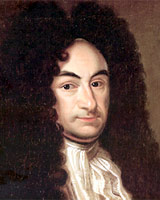Manuscript papers of Gottfried Wilhelm Leibniz formally inscribed on the Memory of the World Register
03-07-2008 (Paris)

Gottfried Wilhelm Leibniz
In a beautifully choreographed ceremony at the Ballhof Eins in Hannover, Germany, the inscription on UNESCO’s Memory of the World Register of the Letters from and to Gottfried Wilhelm Leibniz within the collection of manuscript papers of Gottfried Wilhelm Leibniz was formally recognized.
Commemorative activities, which took place on the occasion of the 362nd anniversary of his birth on 1 July 1646, commenced with the laying of flowers by the UNESCO Representative, Ms Joie Springer and the Director of the Gottfried Wilhelm Leibniz Library, Mr Georg Ruppelt, as well as other officials, at the ossuary of Leibniz in the Court City Church of Neustadt.
This was followed by a formal ceremony at the Ballhof Eins in the presence of Mr Christian Wulff, the Prime Minister of the State of Lower Saxony, Mr Lutz Stratmann, the Minister of Science and Culture, Mr Joachim-Felix Leonhard, Chair of the German Memory of the World National Committee, as well as specially invited guests, including representatives of the German Commission for UNESCO. The certificate was formally handed over to Mr Wulff and Mr Ruppelt in recognition of the importance of Leibniz who was probably the most important figure in 17th century rationalism. He has been very influential in many disciplines including philosophy, theology, physics, mathematics, law, linguistics in some of which he was a pioneer. Leibniz established a global network of correspondents and its size, versatility and completeness allied with the position of Leibniz in his era made his correspondence unique and of world significance.
The Memory of the World Programme was established in 1992 to preserve the world’s endangered documentary heritage. Heritage on the Memory of the World Register comes from all geographic regions. It currently lists 158 items from 67 countries, 1 international organization and 1 private foundation. Heritage ranges from films to rock inscriptions, from sound recording to photographs, from ancient manuscripts to newspaper collections, all of which have bee assessed as meeting established criteria concerning world significance. Decisions on new items to be listed are expected to be made in July 2009 after the meeting of the International Advisory Committee.
This was followed by a formal ceremony at the Ballhof Eins in the presence of Mr Christian Wulff, the Prime Minister of the State of Lower Saxony, Mr Lutz Stratmann, the Minister of Science and Culture, Mr Joachim-Felix Leonhard, Chair of the German Memory of the World National Committee, as well as specially invited guests, including representatives of the German Commission for UNESCO. The certificate was formally handed over to Mr Wulff and Mr Ruppelt in recognition of the importance of Leibniz who was probably the most important figure in 17th century rationalism. He has been very influential in many disciplines including philosophy, theology, physics, mathematics, law, linguistics in some of which he was a pioneer. Leibniz established a global network of correspondents and its size, versatility and completeness allied with the position of Leibniz in his era made his correspondence unique and of world significance.
The Memory of the World Programme was established in 1992 to preserve the world’s endangered documentary heritage. Heritage on the Memory of the World Register comes from all geographic regions. It currently lists 158 items from 67 countries, 1 international organization and 1 private foundation. Heritage ranges from films to rock inscriptions, from sound recording to photographs, from ancient manuscripts to newspaper collections, all of which have bee assessed as meeting established criteria concerning world significance. Decisions on new items to be listed are expected to be made in July 2009 after the meeting of the International Advisory Committee.
Related themes/countries
· Germany
· Memory of the World: News Archives 2008
Share this story:
Contact information
- UNESCO
Source














